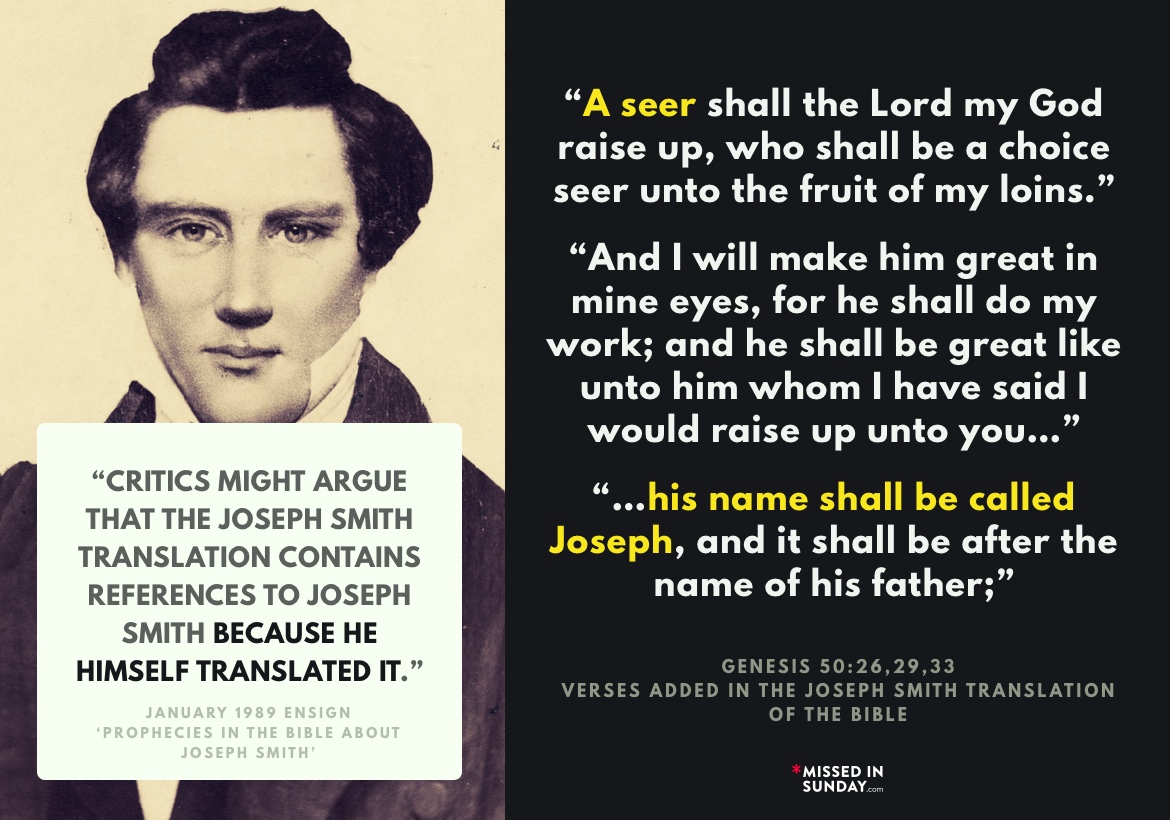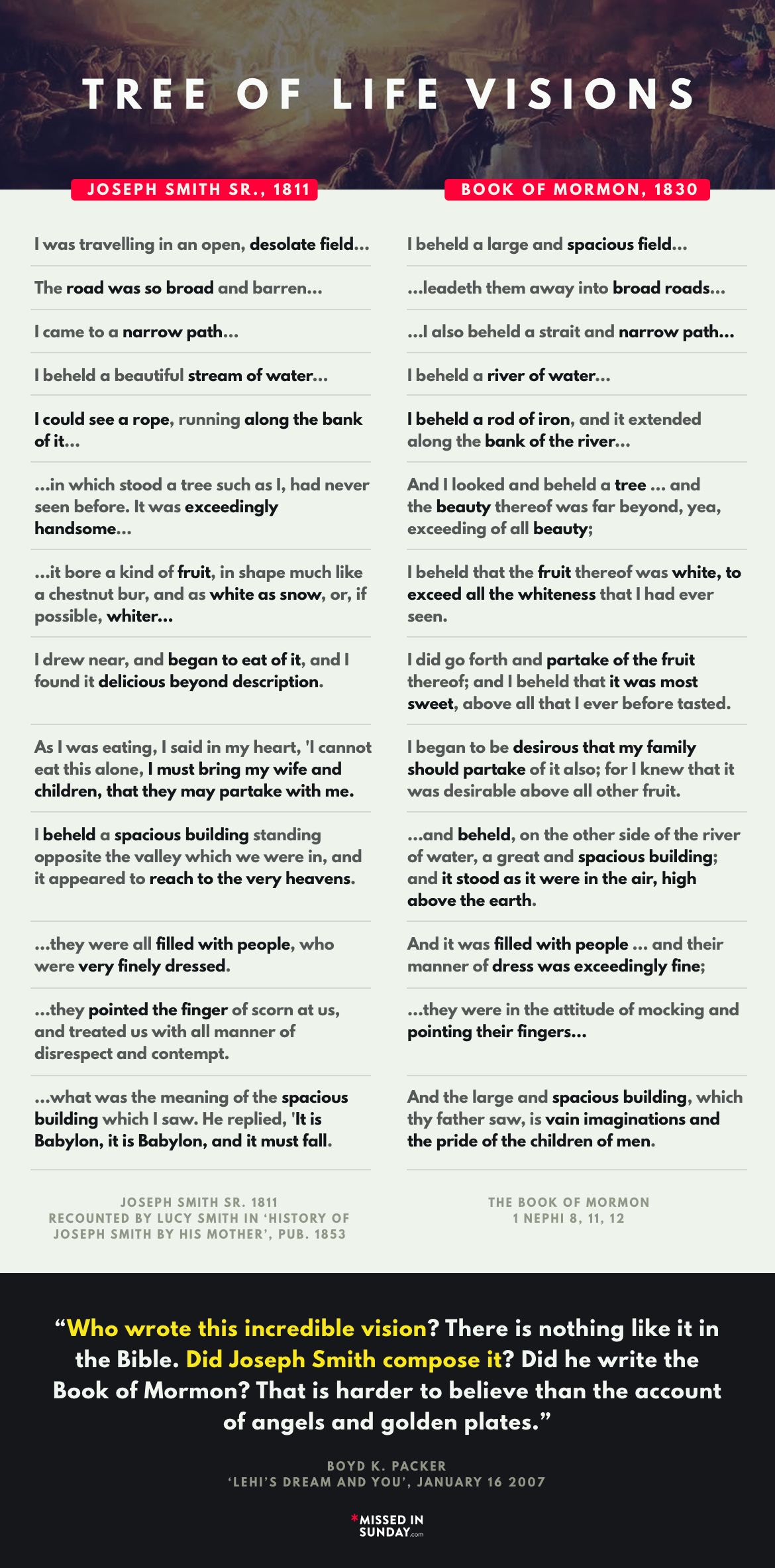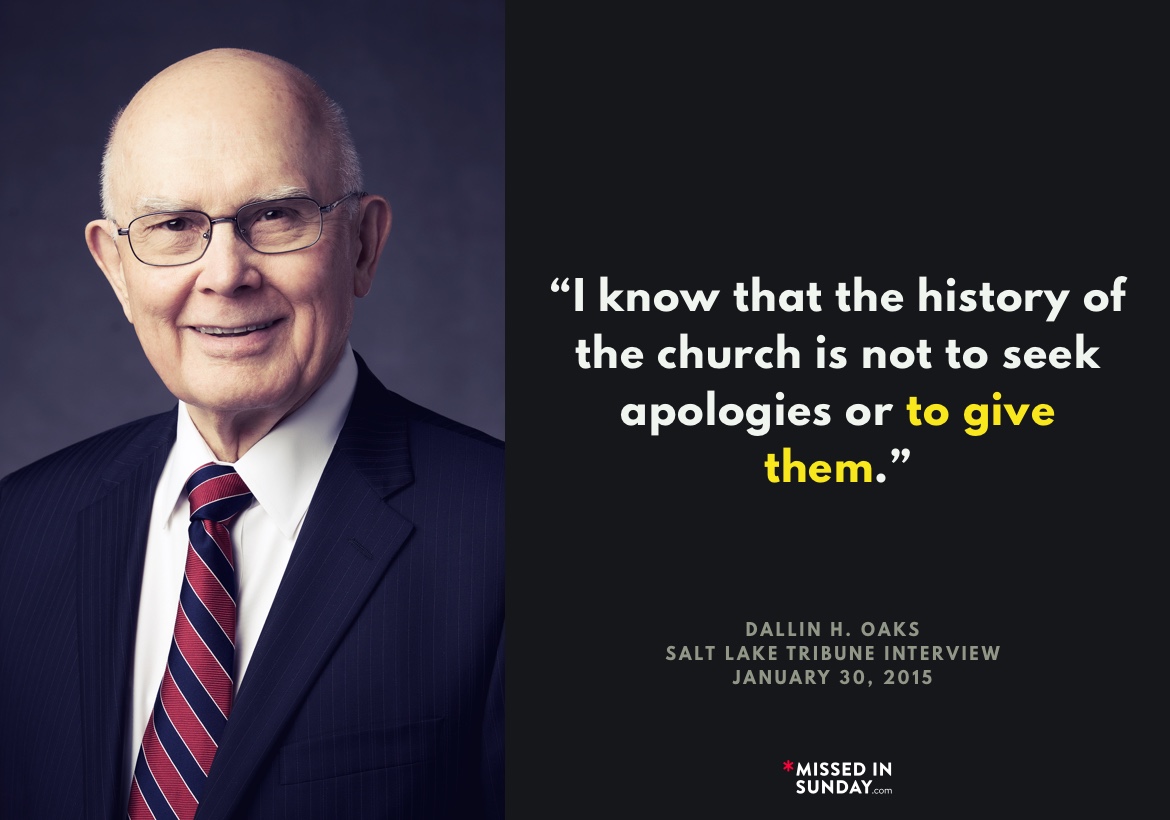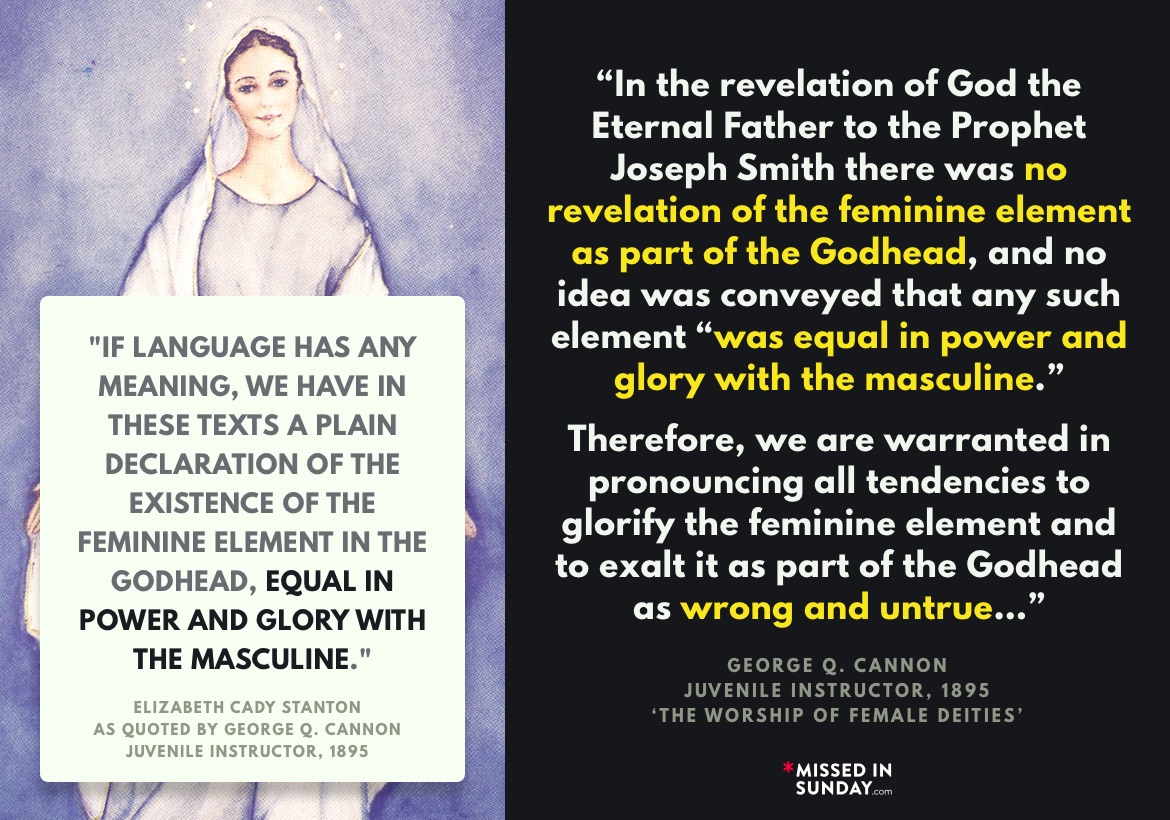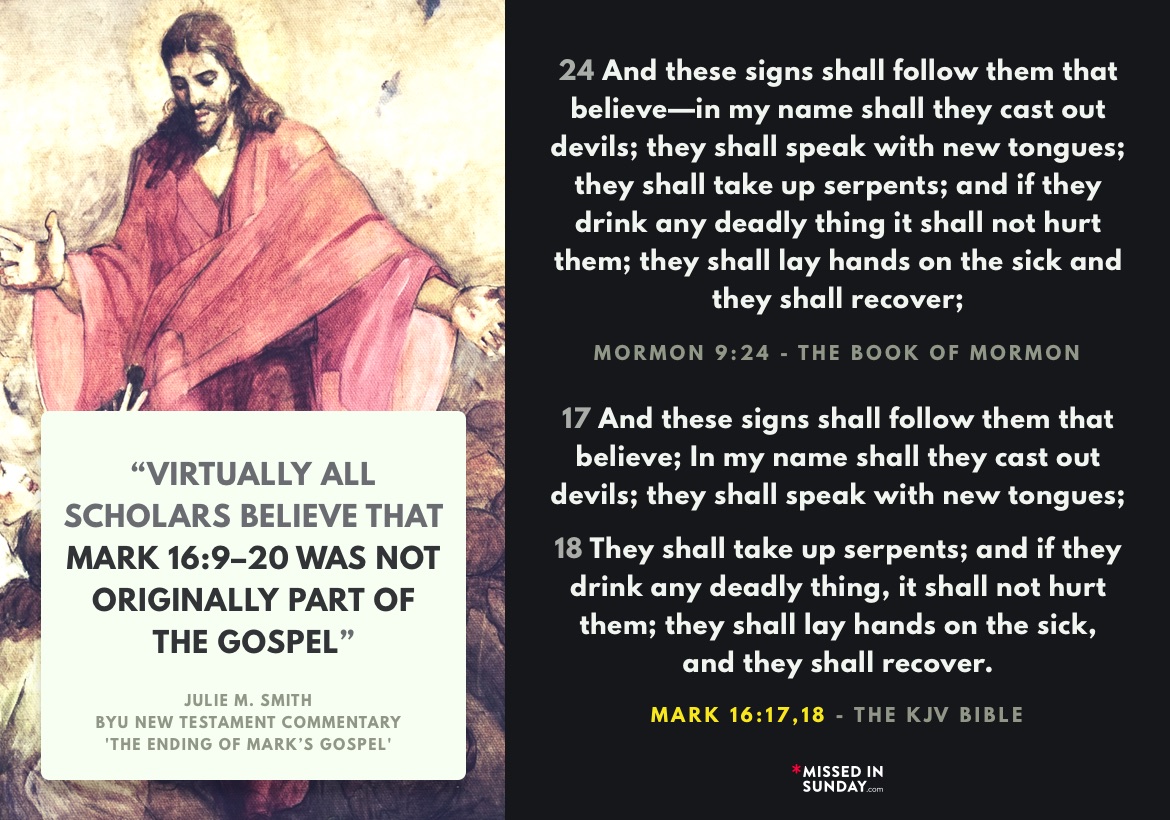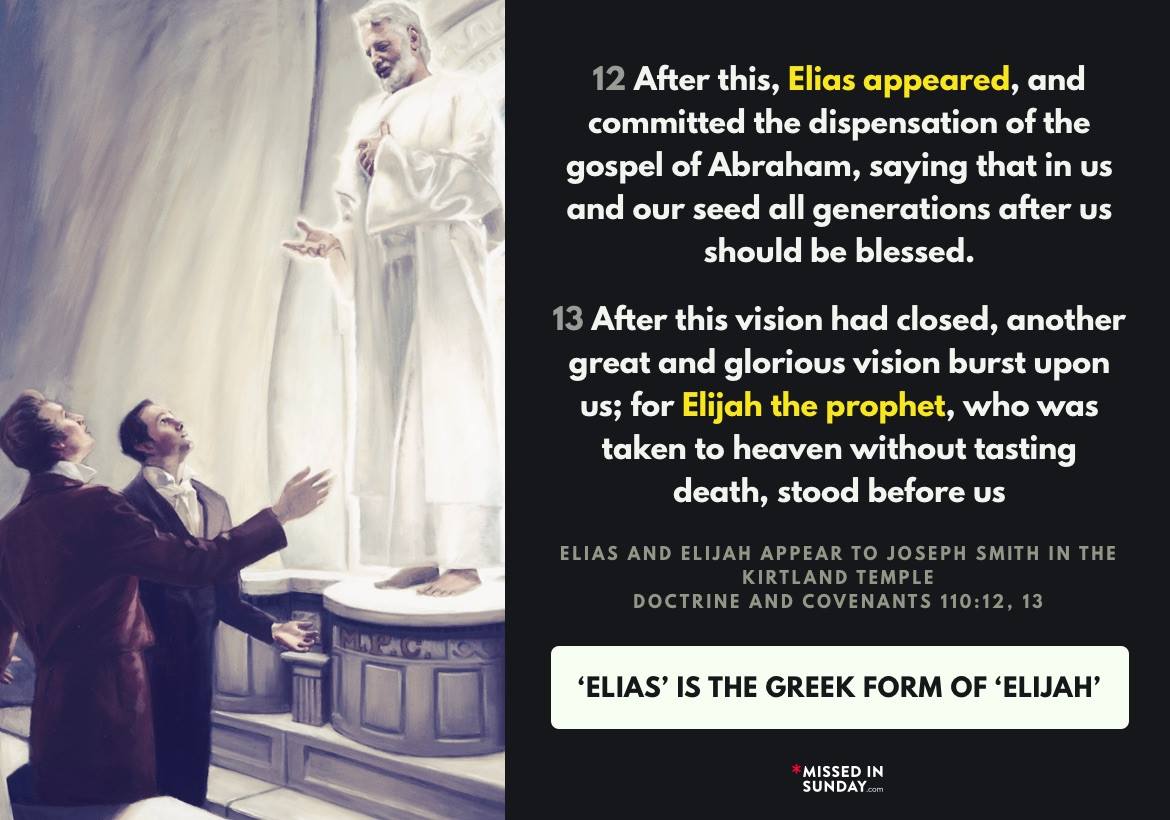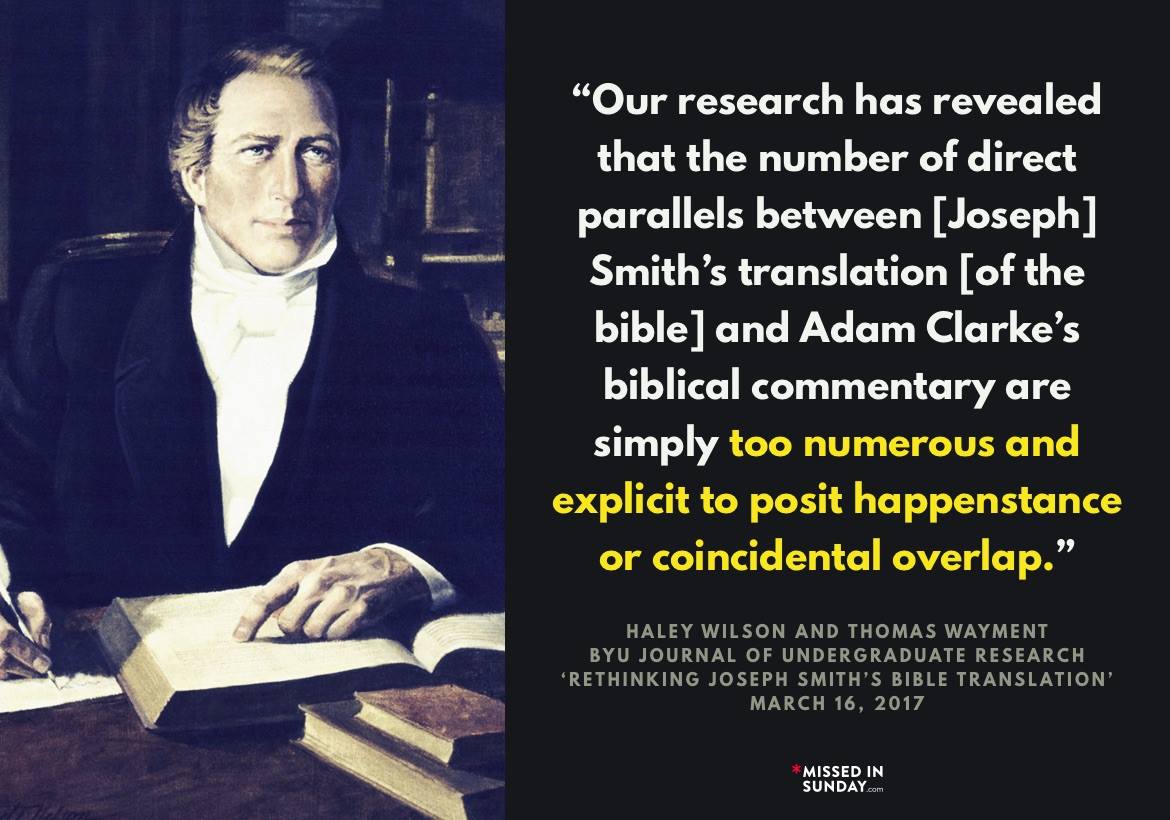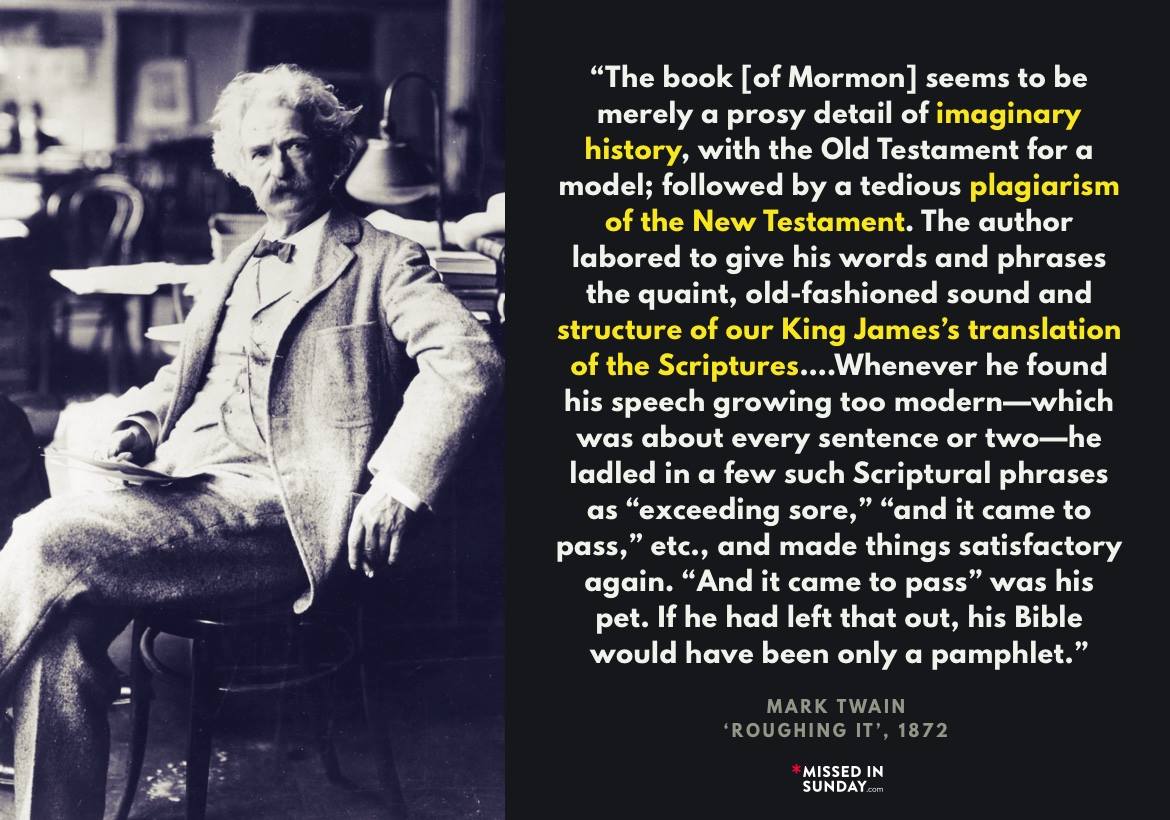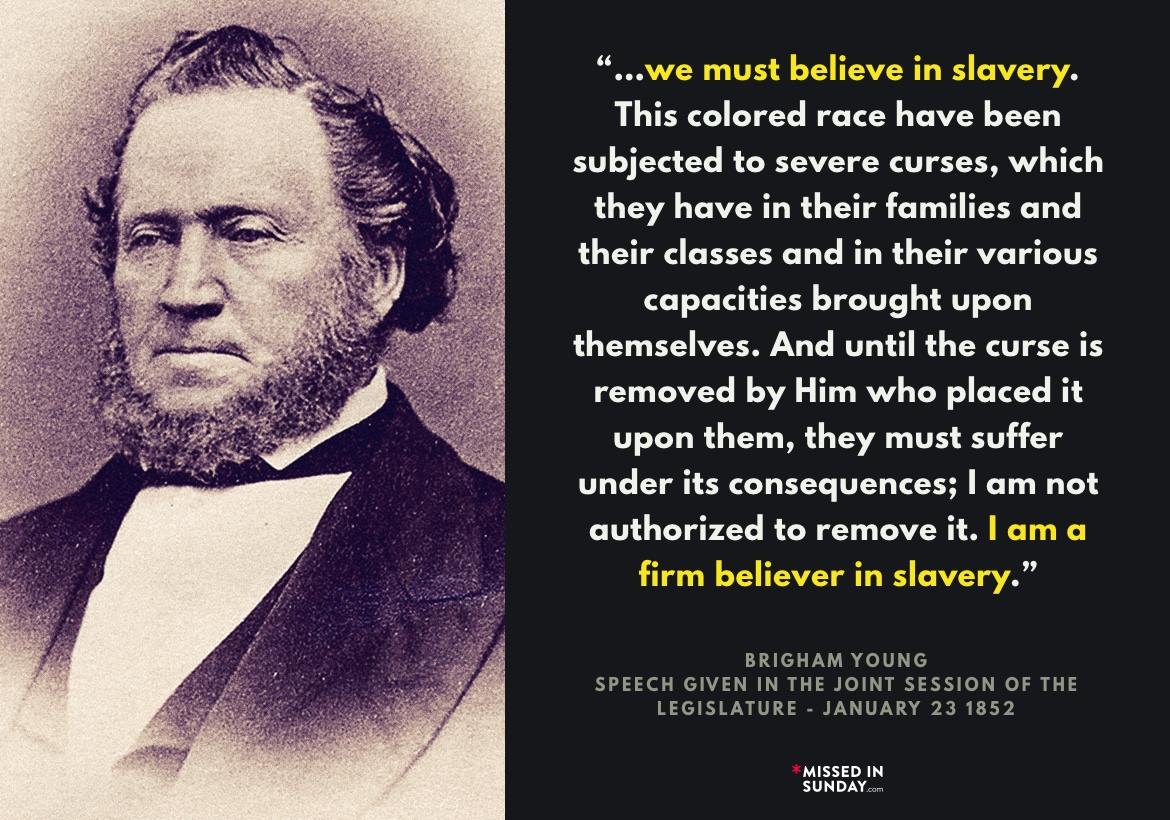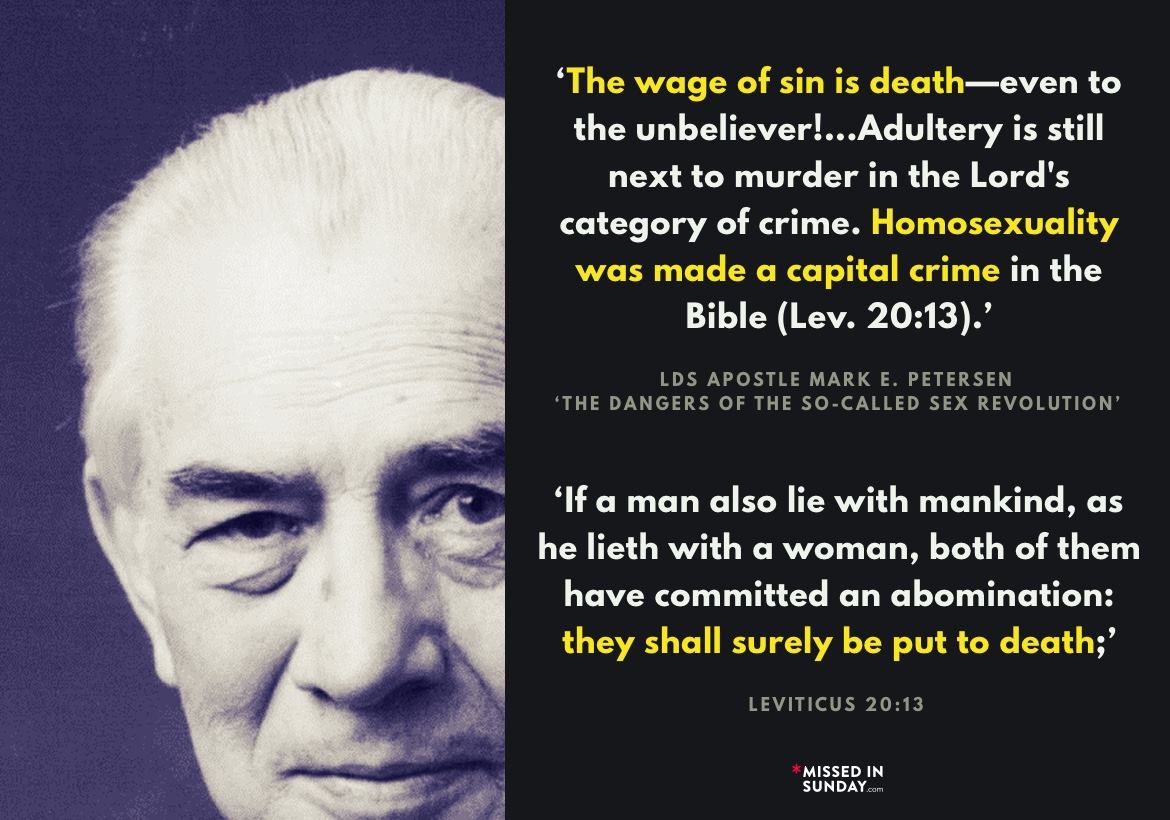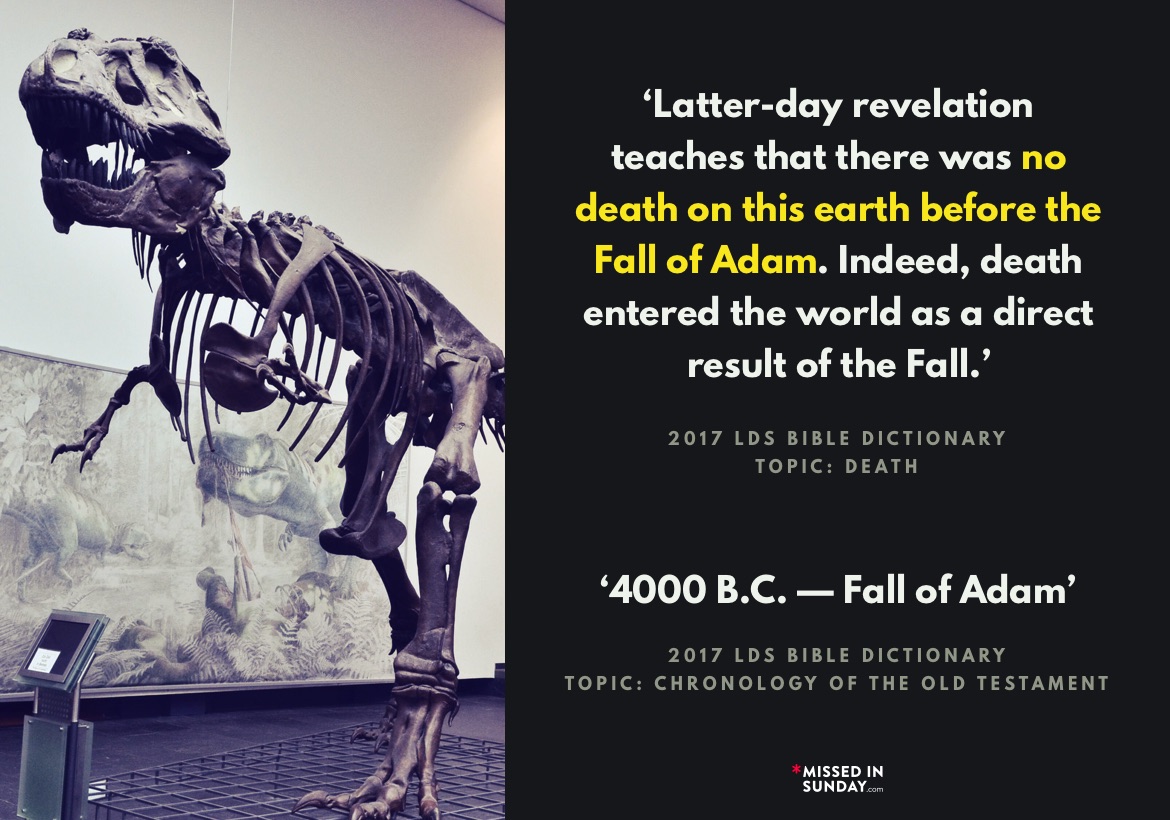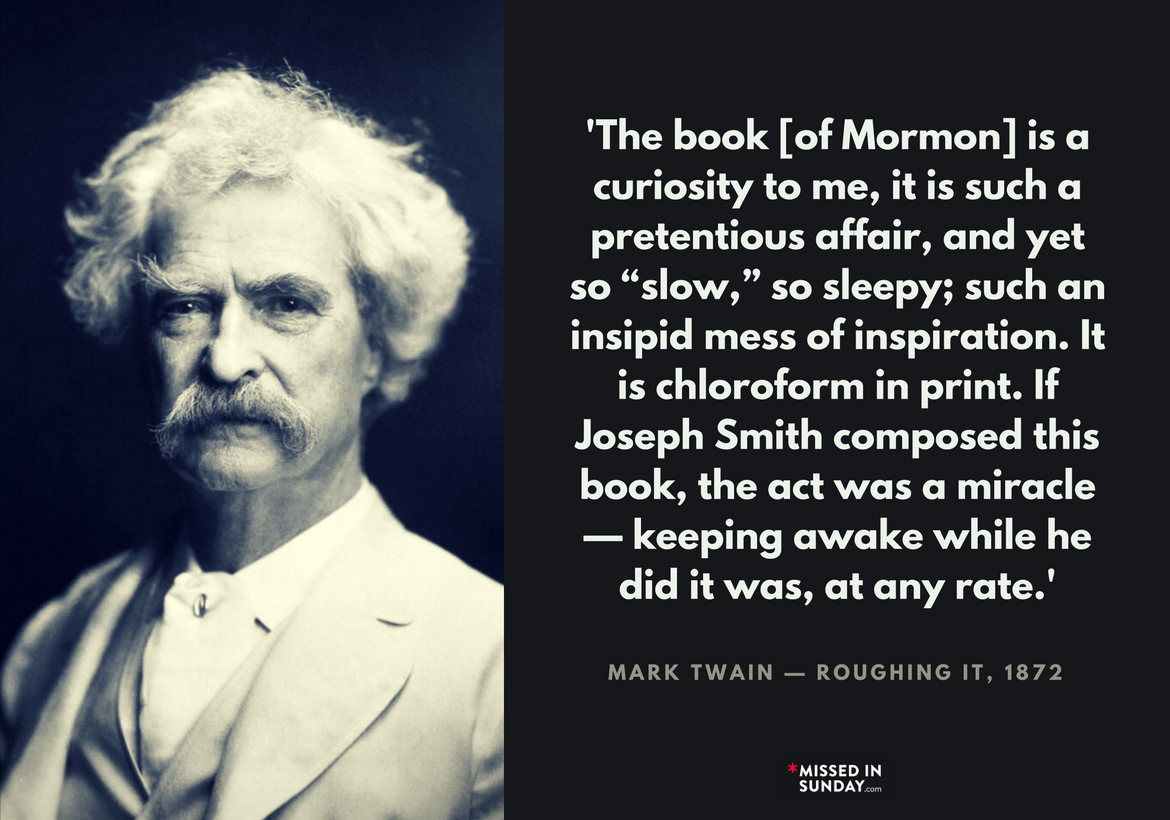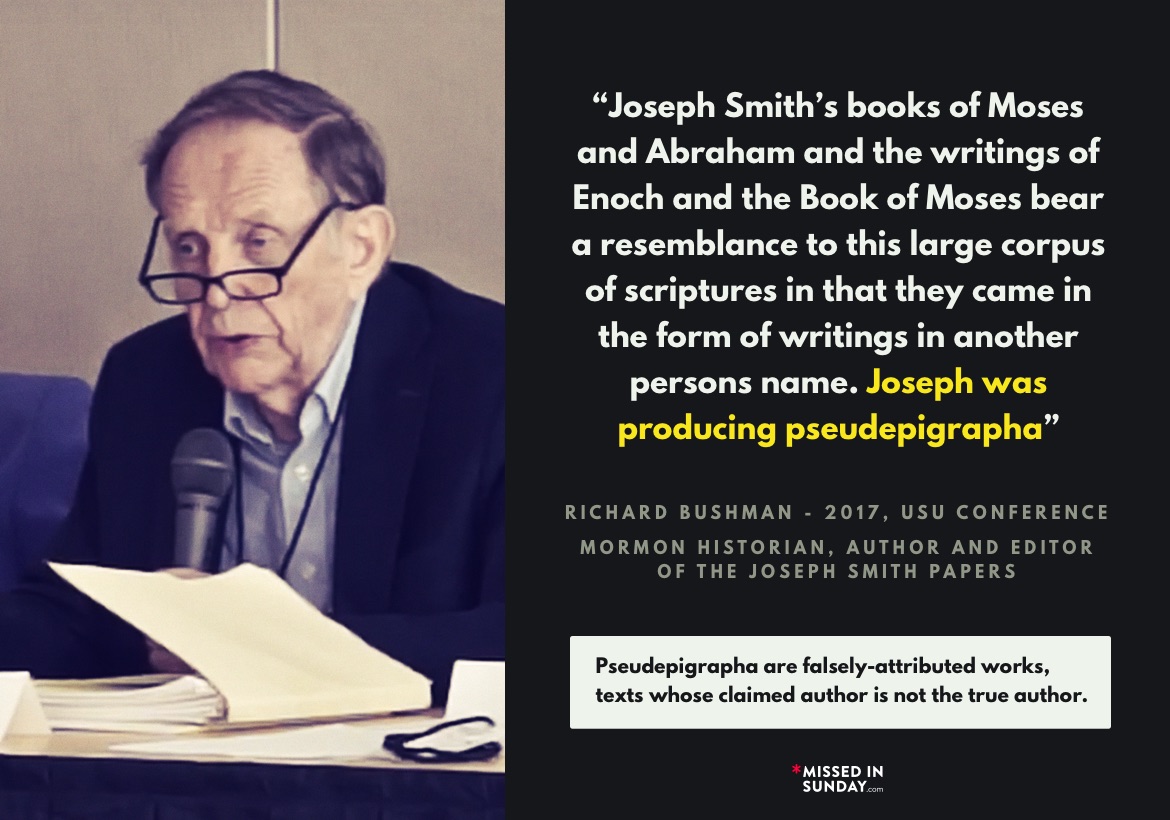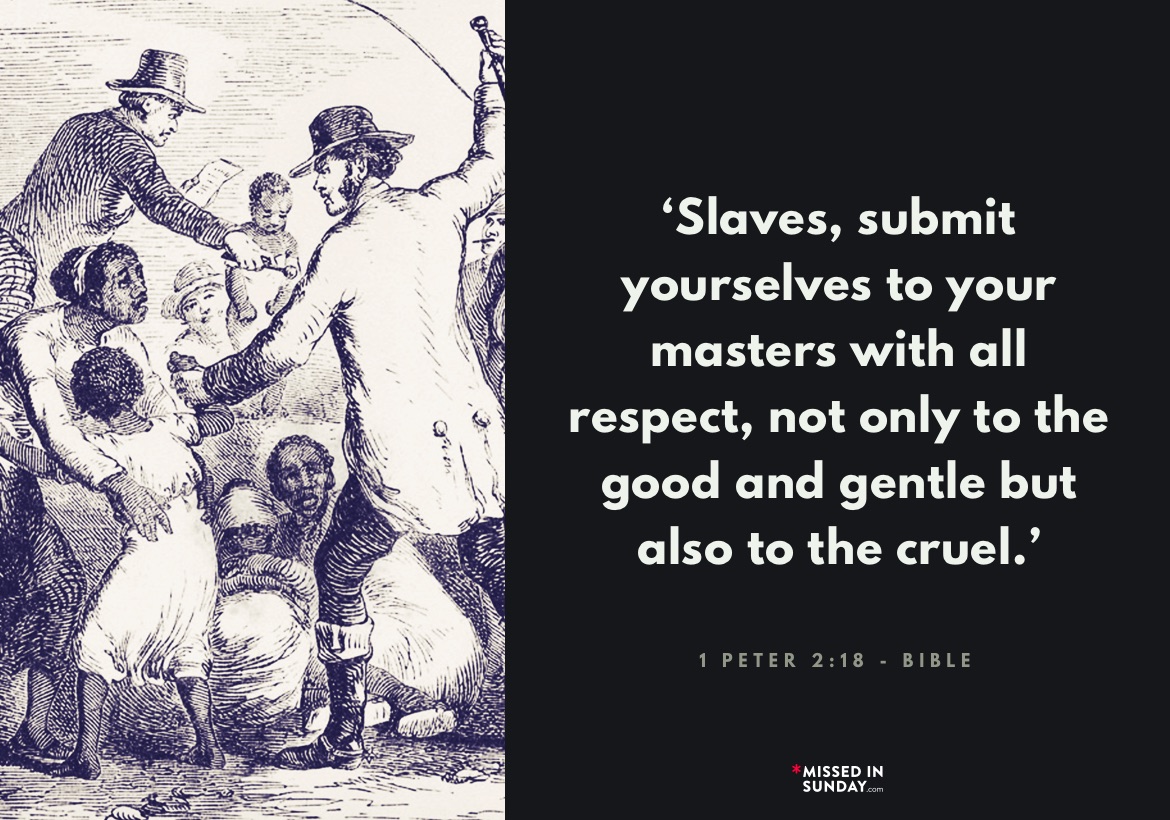Excerpt from the article ‘Prophecies in the Bible about Joseph Smith’, published in the Ensign, January 1989: 1
Critics might argue that the Joseph Smith Translation contains references to Joseph Smith because he himself translated it.
From the Joseph Smith Inspired translation of the bible. Italicized words were added to the King James Version of the bible by Joseph Smith: 2
Genesis 50:24–38
24 And Joseph said unto his brethren, I die, and go unto my fathers; and I go down to my grave with joy. The God of my father Jacob be with you, to deliver you out of affliction in the days of your bondage; for the Lord hath visited me, and I have obtained a promise of the Lord, that out of the fruit of my loins, the Lord God will raise up a righteous branch out of my loins; and unto thee, whom my father Jacob hath named Israel, a prophet; (not the Messiah who is called Shilo;) and this prophet shall deliver my people out of Egypt in the days of thy bondage.
25 And it shall come to pass that they shall be scattered again; and a branch shall be broken off, and shall be carried into a far country; nevertheless they shall be remembered in the covenants of the Lord, when the Messiah cometh; for he shall be made manifest unto them in the latter days, in the Spirit of power; and shall bring them out of darkness into light; out of hidden darkness, and out of captivity unto freedom.
26 A seer shall the Lord my God raise up, who shall be a choice seer unto the fruit of my loins.
27 Thus saith the Lord God of my fathers unto me, A choice seer will I raise up out of the fruit of thy loins, and he shall be esteemed highly among the fruit of thy loins; and unto him will I give commandment that he shall do a work for the fruit of thy loins, his brethren.
28 And he shall bring them to the knowledge of the covenants which I have made with thy fathers; and he shall do whatsoever work I shall command him.
29 And I will make him great in mine eyes, for he shall do my work; and he shall be great like unto him whom I have said I would raise up unto you, to deliver my people, O house of Israel, out of the land of Egypt; for a seer will I raise up to deliver my people out of the land of Egypt; and he shall be called Moses. And by this name he shall know that he is of thy house; for he shall be nursed by the king’s daughter, and shall be called her son.
30 And again, a seer will I raise up out of the fruit of thy loins, and unto him will I give power to bring forth my word unto the seed of thy loins; and not to the bringing forth of my word only, saith the Lord, but to the convincing them of my word, which shall have already gone forth among them in the last days;
31 Wherefore the fruit of thy loins shall write, and the fruit of the loins of Judah shall write; and that which shall be written by the fruit of thy loins, and also that which shall be written by the fruit of the loins of Judah, shall grow together unto the confounding of false doctrines, and laying down of contentions, and establishing peace among the fruit of thy loins, and bringing them to a knowledge of their fathers in the latter days; and also to the knowledge of my covenants, saith the Lord.
32 And out of weakness shall he be made strong, in that day when my work shall go forth among all my people, which shall restore them, who are of the house of Israel, in the last days.
33 And that seer will I bless, and they that seek to destroy him shall be confounded; for this promise I give unto you; for I will remember you from generation to generation; and his name shall be called Joseph, and it shall be after the name of his father; and he shall be like unto you; for the thing which the Lord shall bring forth by his hand shall bring my people unto salvation.
34 And the Lord sware unto Joseph that he would preserve his seed forever, saying, I will raise up Moses, and a rod shall be in his hand, and he shall gather together my people, and he shall lead them as a flock, and he shall smite the waters of the Red Sea with his rod.
35 And he shall have judgment, and shall write the word of the Lord. And he shall not speak many words, for I will write unto him my law by the finger of mine own hand. And I will make a spokesman for him, and his name shall be called Aaron.
36 And it shall be done unto thee in the last days also, even as I have sworn. Therefore, Joseph said unto his brethren, God will surely visit you, and bring you out of this land, unto the land which he sware unto Abraham, and unto Isaac, and to Jacob.
37 And Joseph confirmed many other things unto his brethren, and took an oath of the children of Israel, saying unto them, God will surely visit you, and ye shall carry up my bones from hence.
38 So Joseph died when he was an hundred and ten years old; and they embalmed him, and they put him in a coffin in Egypt; and he was kept from burial by the children of Israel, that he might be carried up and laid in the sepulchre with his father. And thus they remembered the oath which they sware unto him.
We find another prophecy of Joseph Smith contained in the Book of Mormon, 2 Nephi 3:4–22: 3
4 For behold, thou art the fruit of my loins; and I am a descendant of Joseph who was carried captive into Egypt. And great were the covenants of the Lord which he made unto Joseph.
5 Wherefore, Joseph truly saw our day. And he obtained a promise of the Lord, that out of the fruit of his loins the Lord God would raise up a righteous branch unto the house of Israel; not the Messiah, but a branch which was to be broken off, nevertheless, to be remembered in the covenants of the Lord that the Messiah should be made manifest unto them in the latter days, in the spirit of power, unto the bringing of them out of darkness unto light—yea, out of hidden darkness and out of captivity unto freedom.
6 For Joseph truly testified, saying: A seer shall the Lord my God raise up, who shall be a choice seer unto the fruit of my loins.
7 Yea, Joseph truly said: Thus saith the Lord unto me: A choice seer will I raise up out of the fruit of thy loins; and he shall be esteemed highly among the fruit of thy loins. And unto him will I give commandment that he shall do a work for the fruit of thy loins, his brethren, which shall be of great worth unto them, even to the bringing of them to the knowledge of the covenants which I have made with thy fathers.
8 And I will give unto him a commandment that he shall do none other work, save the work which I shall command him. And I will make him great in mine eyes; for he shall do my work.
9 And he shall be great like unto Moses, whom I have said I would raise up unto you, to deliver my people, O house of Israel.
10 And Moses will I raise up, to deliver thy people out of the land of Egypt.
11 But a seer will I raise up out of the fruit of thy loins; and unto him will I give power to bring forth my word unto the seed of thy loins—and not to the bringing forth my word only, saith the Lord, but to the convincing them of my word, which shall have already gone forth among them.
12 Wherefore, the fruit of thy loins shall write; and the fruit of the loins of Judah shall write; and that which shall be written by the fruit of thy loins, and also that which shall be written by the fruit of the loins of Judah, shall grow together, unto the confounding of false doctrines and laying down of contentions, and establishing peace among the fruit of thy loins, and bringing them to the knowledge of their fathers in the latter days, and also to the knowledge of my covenants, saith the Lord.
13 And out of weakness he shall be made strong, in that day when my work shall commence among all my people, unto the restoring thee, O house of Israel, saith the Lord.
14 And thus prophesied Joseph, saying: Behold, that seer will the Lord bless; and they that seek to destroy him shall be confounded; for this promise, which I have obtained of the Lord, of the fruit of my loins, shall be fulfilled. Behold, I am sure of the fulfilling of this promise;
15 And his name shall be called after me; and it shall be after the name of his father. And he shall be like unto me; for the thing, which the Lord shall bring forth by his hand, by the power of the Lord shall bring my people unto salvation.
16 Yea, thus prophesied Joseph: I am sure of this thing, even as I am sure of the promise of Moses; for the Lord hath said unto me, I will preserve thy seed forever.
17 And the Lord hath said: I will raise up a Moses; and I will give power unto him in a rod; and I will give judgment unto him in writing. Yet I will not loose his tongue, that he shall speak much, for I will not make him mighty in speaking. But I will write unto him my law, by the finger of mine own hand; and I will make a spokesman for him.
18 And the Lord said unto me also: I will raise up unto the fruit of thy loins; and I will make for him a spokesman. And I, behold, I will give unto him that he shall write the writing of the fruit of thy loins, unto the fruit of thy loins; and the spokesman of thy loins shall declare it.
19 And the words which he shall write shall be the words which are expedient in my wisdom should go forth unto the fruit of thy loins. And it shall be as if the fruit of thy loins had cried unto them from the dust; for I know their faith.
20 And they shall cry from the dust; yea, even repentance unto their brethren, even after many generations have gone by them. And it shall come to pass that their cry shall go, even according to the simpleness of their words.
21 Because of their faith their words shall proceed forth out of my mouth unto their brethren who are the fruit of thy loins; and the weakness of their words will I make strong in their faith, unto the remembering of my covenant which I made unto thy fathers.
22 And now, behold, my son Joseph, after this manner did my father of old prophesy.
Further Study
Joseph Smith: The Making of a Prophet, Dan Vogel – http://signaturebookslibrary.org/26233/#mormon35
References
| 1 | Prophecies in the Bible about Joseph Smith – https://www.lds.org/ensign/1989/01/prophecies-in-the-bible-about-joseph-smith?lang=eng |
|---|---|
| 2 | Genesis 50:24–38, JST – https://www.lds.org/scriptures/jst/jst-gen/50.html?lang=eng |
| 3 | 2 Nephi 3:4–22, Book of Mormon – https://www.lds.org/scriptures/bofm/2-ne/3.4-22?lang=eng#p3 |

